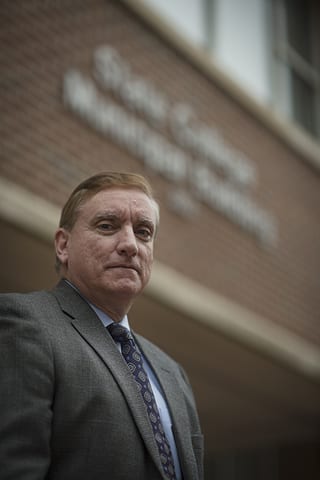John Gardner looks around his new office and laughs. “Sorry, I didn’t get the time to put up anything on the walls yet, been busy,” he says.
When Gardner sits down to talk during one September afternoon, it has been only about a month since he became State College’s new police chief — he took over the position for Tom King, who had been police chief for 23 years, in early August.
A former community baseball coach, a Penn State graduate, a veteran, husband, and a father, Gardner joined the State College police department in 1990 after serving seven years in the Clearfield County Probation Office as chief juvenile probation officer. During his career in law enforcement, he has served various positions, including field-training officer, background investigator, former drug task force member, criminal investigator, and detective.
“I always wanted to be a police officer, ever since I was in eighth grade,” he says.
He graduated from Penn State with a bachelor’s degree in individual and family studies from College of Human Development. That gave him a better understanding about human relationships. During his last semester, he started working in probation as an intern. He eventually earned a master’s degree in administration of justice from Shippensburg University. In 2014, he successfully completed a 10-week long Police Executive and Leadership Command program at the FBI National Academy in Quantico, Virginia.
He is now police chief in a town that has been listed as one of the safest in the country. When dealing with young college students, Gardner says he always tries his best to relate to them and understand their perspective.
The State College police department encourages its officers to be problem solvers and critical thinkers. Although immaturity is largely the reason why many students commit reckless acts, police officers must still hold those students accountable.
“The most important thing about working in a college town is that you cannot over react,” Gardner says. “Not all police officers are capable of policing in a college town, especially officers who are used to dealing with hardcore criminals and are heavy-handed enforcers. We try to ensure that we have the best officers on our team.”
Finding those officers has become a challenge, in part because of the tense relationships between citizens and the police in other parts of the country. State College has taken steps to maintain a positive relationship between its police and local citizens. Gardner says that being able to sit down and communicate is the most important factor of resolving conflicts and misunderstandings.
“Our process is 100 percent transparent,” he says. “That’s one of the reasons we can build that steady trust within the community.”
Each month, State College police meets with Campus and Community in Unity (CCU), an organization that involves many minorities and underrepresented groups, to discuss issues concerning the community.
“We want to work with everyone,” Gardner says. “Open mindedness and open communication is the key to solve these misunderstandings. Police officers are people too. They have friends and families to go back to. … Hopefully one day we will all benefit from our collaborative efforts.”



